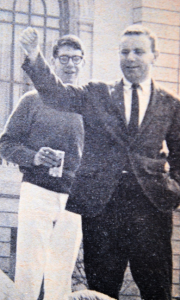The December 1 Zoom exchange organized by and for members of Yale’s undergraduate class of 1964–now available by YouTube recording–had a hint of the divide I described in my 2015 book on the class, but mostly there was agreement that affirmative action for university admissions is on its way out and the job now was going be how to replace it. Maybe that was not surprising, but one element I hoped would be foregrounded—the way our collective histories inform the present—did emerge, though it could well have been missed in the process of exchange.
The Michigan Mandate Jim Duderstadt put into place in his roles as provost and president of the University of Michigan in the late 1980s was the target of the two Bollinger (so named for Lee Bollinger, Duderstadt’ s successor) Supreme Court cases that prohibited racial quotas for admissions. Such an approach had already been abandoned for undergraduates at Michigan, but the law school, like other select educational institutions, was allowed under the second ruling to consider race among other factors for admission. It’s that element of affirmative action that is now under fire and likely to be prohibited. Jim presented charts showing how much the university accomplished while the Mandate was in effect, not just in diversifying the student body but faculty and administration as well. Following the court decisions and the institution of new leadership, however, minority presence shrank quickly and has not since been reversed. What was most stunning about his presentation was that admissions was never a primary object of reform as the elements of the Mandate went into place. That suggests that select universities have to have the will to reverse such declines, and they can’t count on outside factors like a court ruling to force them to do it. Clearly Duderstadt has attempted to keep the fire behind the Michigan Mandate going, writing a 200-page treatise on the subject, and citing favorable reviews of the program that still appear. One effect of the Zoom exchange was bringing that set reforms back into the contemporary conversation.
Much of the exchange that followed focused on how admissions might be changed once affirmative action was prohibited, whether by shifting the goal of diversity to socio-economic or some other factor such as targeting candidates from zip codes known for lack of opportunity. As things now stand, Tony Mason, a ’64 Amherst graduate pointed out, his alma mater is nearly 50 percent minority, but it lacks economic diversity. That prompted a strong response from Rutgers President Jonathan Holloway, who speaking from his own experience and observations as a Black man, suggested that any one of those privileged minorities walking into a room of similarly privileged whites would inevitably start off at a disadvantage in attempting to seize the opportunities available. He could live with disparities of wealth and social opportunity for now, he acknowledged, but not for future generations, giving him and other educational leaders every incentive to find ways to extend opportunity to those whose race has kept them back over time. It is not by accident that Holloway has made it a priority to make Rutgers a “beloved community.”

Joe Lieberman addresses fellow students before leaving for Mississippi in 1963
In his opening remarks Holloway, who earned his PhD in history from Yale in 1998, said how privileged he was participating in this group with so many people who had themselves made history. Appropriately enough, Joe Lieberman opened the second segment of the program recounting, as I asked him to, his experience his junior year in 1963 working in the Mississippi Freedom campaign aimed at demonstrating Black determination to vote. Speaking vividly of how his faith brought him to the cause but how much more he carried away, the experience could have been yesterday. I had hoped Lieberman would connect his account directly with his public life, but lacking time to do so, that was not entirely necessary. Whatever his particular feelings about affirmative action over time, his presence at rallies in Black churches where the cause of representation gained additional moral power, had clearly stayed with him throughout his life. The very fact that the former pastor of Martin Luther King’s parish in Atlanta was running a crucial campaign for re-election to the Senate where Lieberman once served himself, underscored the poignancy of his remarks.
That opened the way for Joe Rich, a career civil rights lawyer, who got his law degree from Michigan, to speak about the contemporary threat to the last vestige of the 1965 Voting Rights act. Influenced in his own career choice when a talented black grade school classmate was rejected at the private academy he and other white classmates attended, Rich clashed with classmate Brad Reynolds, when he steered the Civil Rights Division of the Justice Department towards a color-blind reading of the law. Rich left his career post finally in 2005, finishing his career at the Lawyers Committee on Civil Rights Under Law. There he met the final panelist, John Brittain. A civil rights lawyer who recently wrote an essay with Richard Kahlenberg on alternatives to considering race directly in admissions, he was especially helpful addressing questions from the audience.
The format for such a program is better suited in a group presentation to opening up ideas than it is to pinning them down. From the process itself, however, my faith in my colleagues was confirmed. As I put it concluding Class Divide: “What best can be said of these men is that they did not remain on the sidelines. In their own explorations of, and adaptations to, a world largely redefined in their own lifetimes, they left a valuable legacy: the commitment to work through persistent contradictions in American life and to leave a record of their own actions and perceptions for future generations to build upon.”